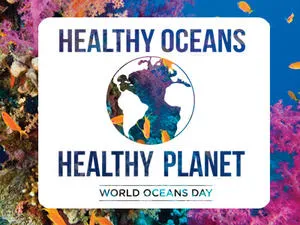
Healthy Oceans, Healthy Planet is the theme of this year’s World Oceans Day and the National Oceanography Centre couldn’t agree more. “Of course, every day is World Oceans Day at the NOC!” according to Ed Hill, the NOC’s Executive Director.
The ocean is the dominant physical feature on planet Earth and its largest and most valuable ecosystem. As human population grows to 9 billion by 2050, attention is turning ever-more to the ocean for vital resources – food, energy, minerals, natural products. But the ocean also risks losing its productive capacity as it comes under unprecedented pressure from human activity.
Oceanography is like space exploration – it is big science demanding international cooperation, long planning times, sustained measurements, large research infrastructure and advanced technologies. But we know more about the lifeless surfaces of Mars and the Moon than about the ocean floor – which is teeming with life and holds vast potential. As well as being vital to our understanding of the planet, ocean science has obvious applications to clear and present human concerns – some of the greatest challenges of our age:
- feeding 9 billion people by 2050
- securing clean energy to power vibrant economies
- increasing resilience of coastal populations to flooding from the sea
- making sense of global and regional climate change and variability
- recovering the ocean’s productive capacity to support human needs sustainably
“We describe our science focus here as ‘big ocean science’ meaning study of the large-scale ocean over decades with big teams of scientists bringing expertise in physics, biology, chemistry, geology, mathematics and advanced technologies to bear in an integrated way on tackling big problems such as the role of the ocean in the climate system and exploring the deep sea frontier.
Oceanography is a truly international endeavour. Scientists at the NOC collaborate with colleagues around the world and we attract staff and students from many countries. International collaboration offers many benefits, including greater science impact, access to facilities, filling gaps in data and the promotion of excellence through training, international comparison and knowledge exchange.
This approach is enabling us to deliver research which is being used by the global marine community, including those involved in policy setting, renewable energy, hazard management, weather forecasting and understanding climate change.”
The health of the ocean is being measured by scientists at the NOC in a multitude of ways from looking into the ‘twilight zone’ to study carbon storage, to looking after the South Atlantic tide gauge network to monitor sea level rise, and studying the Atlantic Meridional Overturning Circulation giving valuable new insights into how ocean currents can affect global warming.